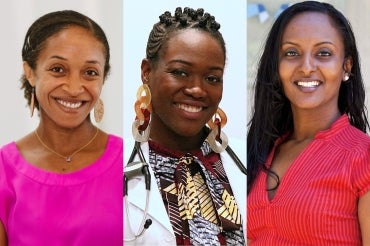Researchers call for Afrocentric approach to boost vaccine uptake among Black communities

Aisha Lofters, Onye Nnorom and Azza Eissa are co-authors of a commentary published in CMAJ (photos by Ilhaan Dahir, Katherine Barcsay and Apostolos Dimitromanolakis)
Published: August 17, 2021
Researchers at the University of Toronto’s Temerty Faculty of Medicine say an Afrocentric approach centred on respecting patients’ values and perspectives can help increase vaccination rates among Black people who are at high risk of contracting and being hospitalized by COVID-19.
The approach is discussed in a commentary that was published recently in CMAJ (Canadian Medical Association Journal).
“An Afrocentric approach, which acknowledges that health-care experiences of Black people are affected by historical and present-day anti-Black racism, can be combined with communication frameworks to counsel vaccine-hesitant patients,” says Onye Nnorom, a family physician and assistant professor at the Temerty Faculty of Medicine’s department of family and community medicine and at the Dalla Lana School of Public Health who is also the president of the Black Physicians’ Association of Ontario.
Nnorom and the commentary’s other co-authors are a team of Black clinicians, researchers, nurses and community health leaders who have been involved in addressing COVID-19 vaccination in Black communities.They include: Aisha Lofters, an associate professor in the department of family and community medicine and clinician scientist and family physician at Women’s College Hospital; Azza Eissa, a family medicine clinician scholar resident in the department of family and community medicine and an MSc candidate in clinical epidemiology and health research at the Dalla Lana School of Public Health; Cheryl Prescod, executive director of the Black Creek Community Health Centre and Nancy Akor, a registered nurse at Toronto’s TAIBU Community Health Centre.
Despite the higher risks of infection and serious complications, only 56.6 per cent of Black Canadians reported a willingness to be vaccinated compared with 76 per cent of people in the general population.
To combat vaccine hesitancy, which has roots in medical distrust and structural racism, the authors discuss how Afrocentric approaches and the “LEAPS of care” counselling framework have been successful in increasing flu and COVID-19 vaccinations in Black communities.
The LEAPS of care framework encourages providers to:
- Listen and learn more about the patients’ lived experiences
- Empower and engage patients by respecting their own self-determination and perspectives
- Ask and acknowledge patients’ concerns and previous healthcare encounters where they may have experienced racism
- Paraphrase and provide vaccine recommendations
- Support and spark community-partnerships to respectfully overcome barriers to vaccination and support patients navigating a complex system.
“Black patients experience disrespectful discourse with providers because of anti-Black racism and biases in health care. Our position is that, in every encounter, patients should feel respected. Please respect Black patients’ values, views and concerns when it comes to the vaccine,” says Nnorom. “That’s how we can rebuild trust and that is the key message from this framework.”
The researchers say Black-led community partnerships are effective at helping increase vaccinations, noting that vaccine clinics held in a Toronto hotspot neighbourhood from April to May 2021 increased vaccine uptake from 5.5 per cent to 56.3 per cent.
“Confidence in the vaccines will not improve if Black communities are told that they are at high risk and should continue to socially distance, while they are also excluded from vaccine priority lists or are not provided greater access to vaccines,” say the authors.
“Providers should offer accurate, current information to high-risk Black patients about how to access vaccines.”

